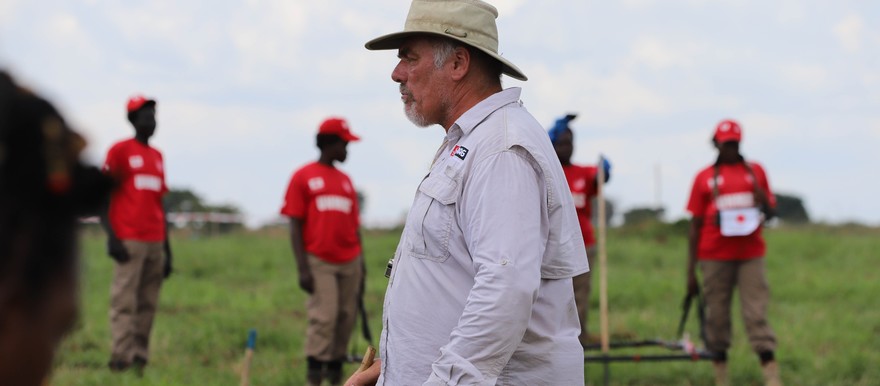A high-level delegation on Tuesday visited a site in Torit State that is contaminated with cluster munitions to see first-hand how humanitarian mine action can prevent physical harm to civilians, improve access to basic services and help people rebuild their lives in the wake of conflict.
The delegation, led by the Ambassador of Japan to South Sudan, Seiji Okada, and the Chief Representative of Japan International Cooperation Agency (JICA), Shinya Tomonari, witnessed the clearing and disposal of cluster munitions by UNMAS humanitarian mine action teams in Amee, Magwi, approximately 125 kilometers south of Juba.
The delegation also met with local authorities and members of the community who benefit from this work.
"Mine clearance is crucial for the on-gong nation building in South Sudan as it provides safe land for returnees to resettle and cultivate. As this country is struggling for peace and stability, Japan has been supporting South Sudan with mine action activities since 2011 and will continue to support it along with Japan's other assistance with the peace process, humanitarian activities and development,” said Ambassador Okada.
Other members of the delegation included the Special Representative of the Secretary-General (SRSG) and Head of UNMISS, David Shearer, Tobiolo Alberio Oromo, the Governor of Torit State, Jurkuch Barach Jurkuch, the Chairperson of South Sudan’s National Mine Action Authority (NMAA), and Richard Boulter, Programme Manager of UNMAS.
“In the wake of the peace agreement, many people want to return to their homes in this area. Clearing the roads and land will help give them confidence to resettle here and start growing crops so that they can support their families. It will also encourage investment in new infrastructure,” said SRSG, David Shearer. “In this way, humanitarian mine action is making an important contribution to the peace process and the development of this country.”
The delegation visited a farming area where approximately 1,000 people once cultivated maize, beans, soya beans, eggplant, cabbage, okra, tomatoes, and onions. However, during the civil war, Amee experienced fighting and aerial bombardment which left large tracts of land littered with cluster munitions. Most people fled the area and the land was abandoned.
UNMAS’ humanitarian mine action teams, funded by Japan, have been surveying and clearing the area near the Juba-Nimule road, which is the main route for returnees travelling from Uganda.
UNMAS also welcomed the contribution of the government of Japan to its work in South Sudan.
“The Government of Japan’s vital support for humanitarian mine action activities and strong initiative for building the capacities of the NMAA to plan, coordinate, manage, and monitor mine action operations have been critical in the progress of mine action in South Sudan,” said UNMAS’ Programme Manager, Richard Boulter. “Such support has been, and we hope will continue to be, a critical enabler of humanitarian aid, a key driver of socioeconomic development, and a strong enabler of the Sustainable Development Goals.”




